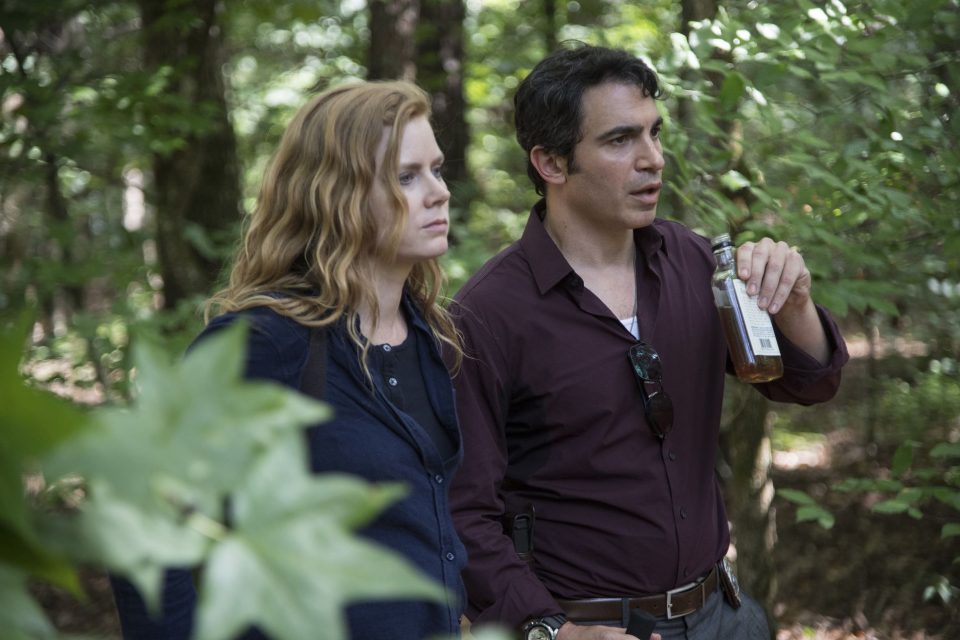‘Sharp Objects’ Review: HBO Drama Cuts Like a Knife
Amy Adams is riveting in a miniseries that’s dark as night and as easy to get lost in.
★★★★½
One of the two dead girls at the center of the mystery behind HBO’s Sharp Objects is memorialized with purple ribbons, even though her favorite color was black. “That seemed too grim,” suggests a neighbor to reporter Camille Preaker (Amy Adams), who has returned to her small, sweltering Missouri hometown to cover the investigation. Black may not be grim enough to capture the spirit of the place, whose major holiday celebrates a Confederate Army wife who held up under Union rape and torture, losing a pregnancy in the process.
“We don’t have a lot of happy occasions around here,” Camille explains to a dismayed outsider.
Adapted from the Gillian Flynn novel by producer/writer Marti Noxon and others (including Flynn herself) and director Jean-Marc Vallée, the miniseries (it debuts Sunday; I’ve seen seven of the eight episodes) is dark as night, and just as easy to get lost in.
Adams is riveting as our profoundly self-loathing heroine, forced to confront a past that includes a dead sister, a brittle and imperious mother (Patricia Clarkson, whose soft purr can hit with devastating force), and an erratic teen half-sister (Eliza Scanlen), along with a host of issues that are paralyzing her in the present. There are few scenes in the story where Camille isn’t soaked in vodka, and that’s not even close to her most self-destructive vice. Her editor Frank (Miguel Sandoval) has put her on this story as a form of shock therapy that will make her confront every problem at once; within a few episodes, he begins to recognize that the memories are too much for anyone, let alone someone as eager to carve herself up as Camille.
“It’s just that, whenever I’m here, I feel like a bad person,” she admits.
Adams is onscreen in nearly every scene, and the ones where she isn’t usually involve other characters discussing Camille. This is a heavy burden to place even on a five-time Oscar nominee, but Adams’ performance is so lived-in and matter-of-fact about the many horrific details of Camille’s life that she more than carries it all. Sharp Objects is designed as a standalone mystery, but it’s easy to imagine Adams returning periodically to this role, which is a 21st century, damaged version of all those old movie and TV private eyes whose bodies (livers especially) and minds take a beating on the way to a difficult truth.
But Vallée is just as much a star of the production as his leading lady, making the omnipresent, ephemeral quality of memory itself the most important part of the story, and the way it’s told. Expanding on some of the stylistic techniques he used in Big Little Lies, Vallée smashes open barriers between past and present, so that Camille and the viewer are often experiencing both at once. As the young Camille, It’s Sophia Lillis is such a dead ringer for Adams from certain angles that it occasionally looks like Adams has just been digitally de-aged.
There’s also a tactile pleasure to the production. You will practically be able to taste the booze that Camille keeps hiding in Evian bottles (fooling no one), smell the stench of the family hog farm, and feel every sticky degree of Midwestern summer heat as Camille, an out of town investigator (Chris Messina) and the local police chief (Matt Craven) work at cross-purposes to figure out who has been preying on these girls. As was the case in Big Little Lies, music is an important secondary character, as Camille turns to an eclectic playlist (ranging from Led Zeppelin to Sylvan Esso) given to her by a young friend(*) in times of extreme stress ”” which, for her, is pretty much always.
(*) Said friend is played by Sydney Sweeney, who’s having quite the versatile, era-spanning year, first as the Nineties high school drama queen in Netflix’s Everything Sucks!, then as Nick’s child bride in the new season of The Handmaid’s Tale, and here as a very contemporary and fragile girl. She and Scanlen (whose performance reconciles seemingly contradictory bits of characterization well before they’re even explained) are both names to watch.
Sharp Objects is primarily a Gothic mystery, but also an incisive psychological portrait of both its heroine and the old-fashioned, sexist community that produced her, the dead girls, and possibly their killer. TV’s inundated with humorless serialized tales of murder that wallow in their own misery. Sharp Objects is at no point fun, but is executed at such a remarkable level that it’s as thrilling as it is tragic.




